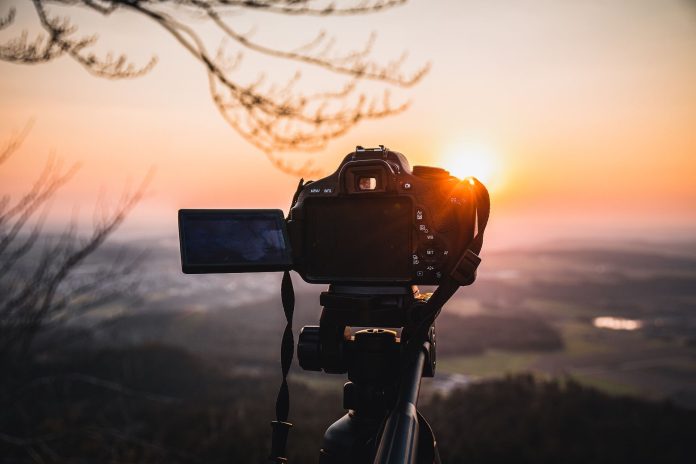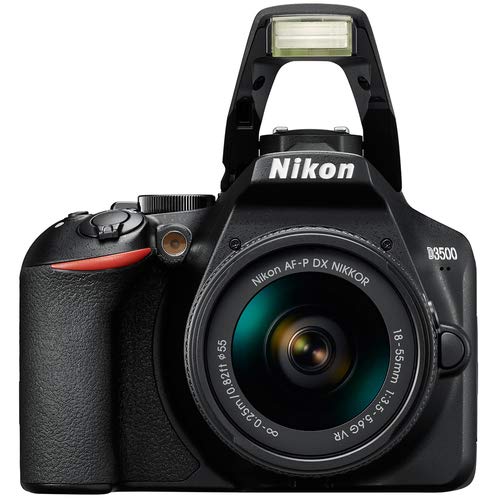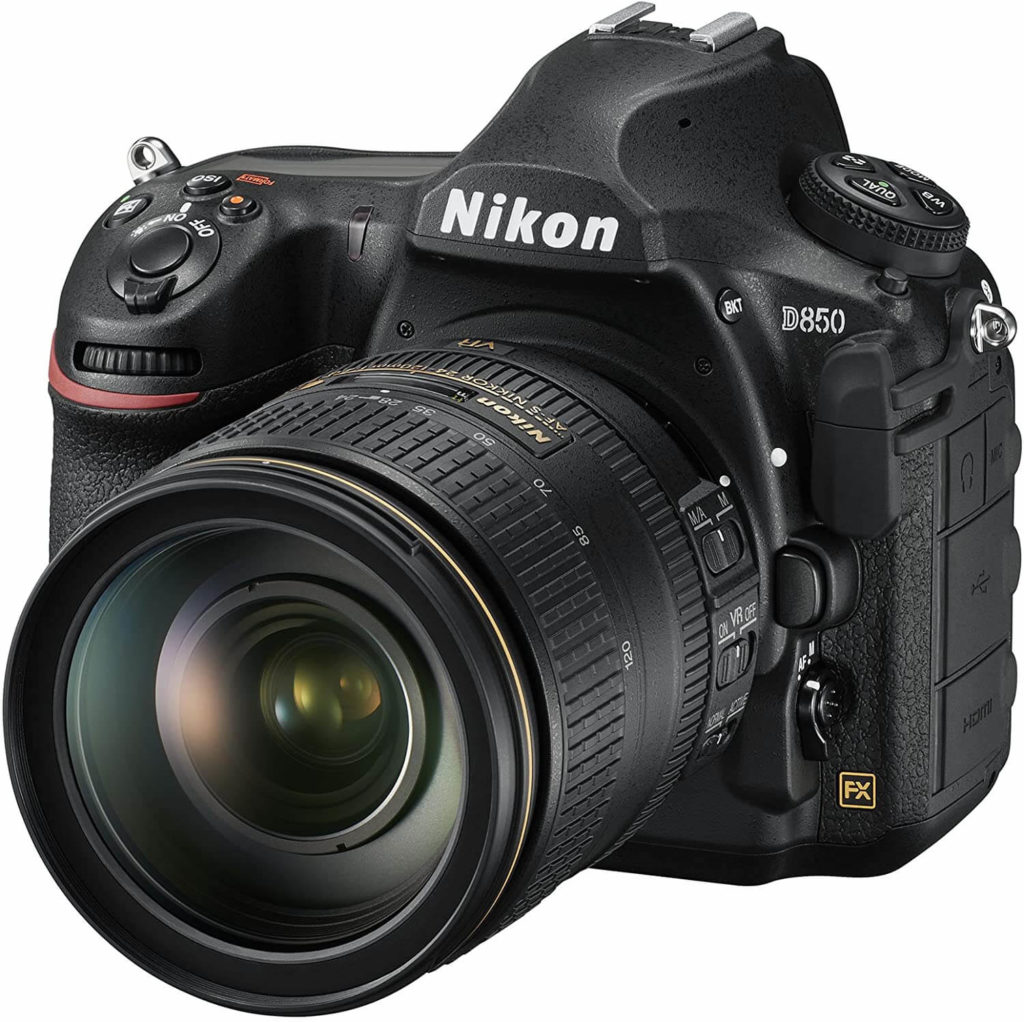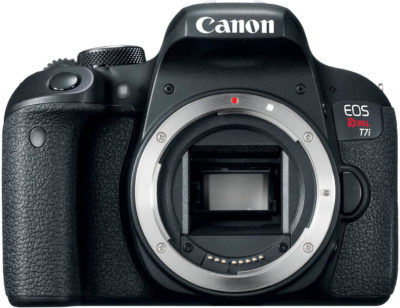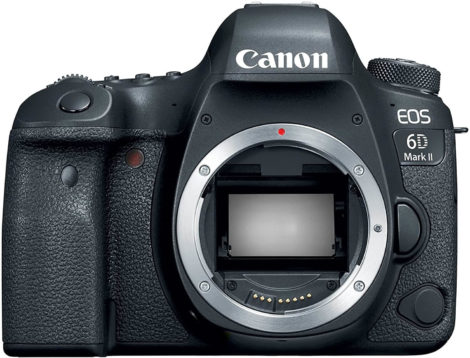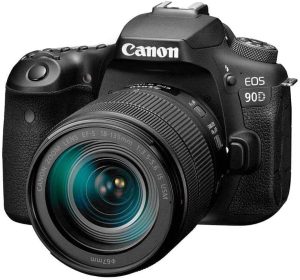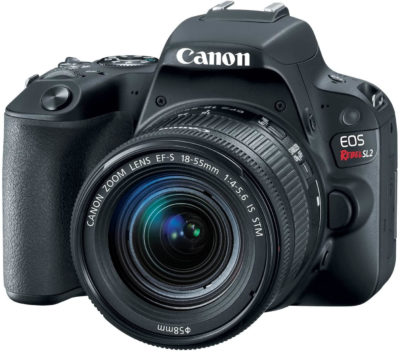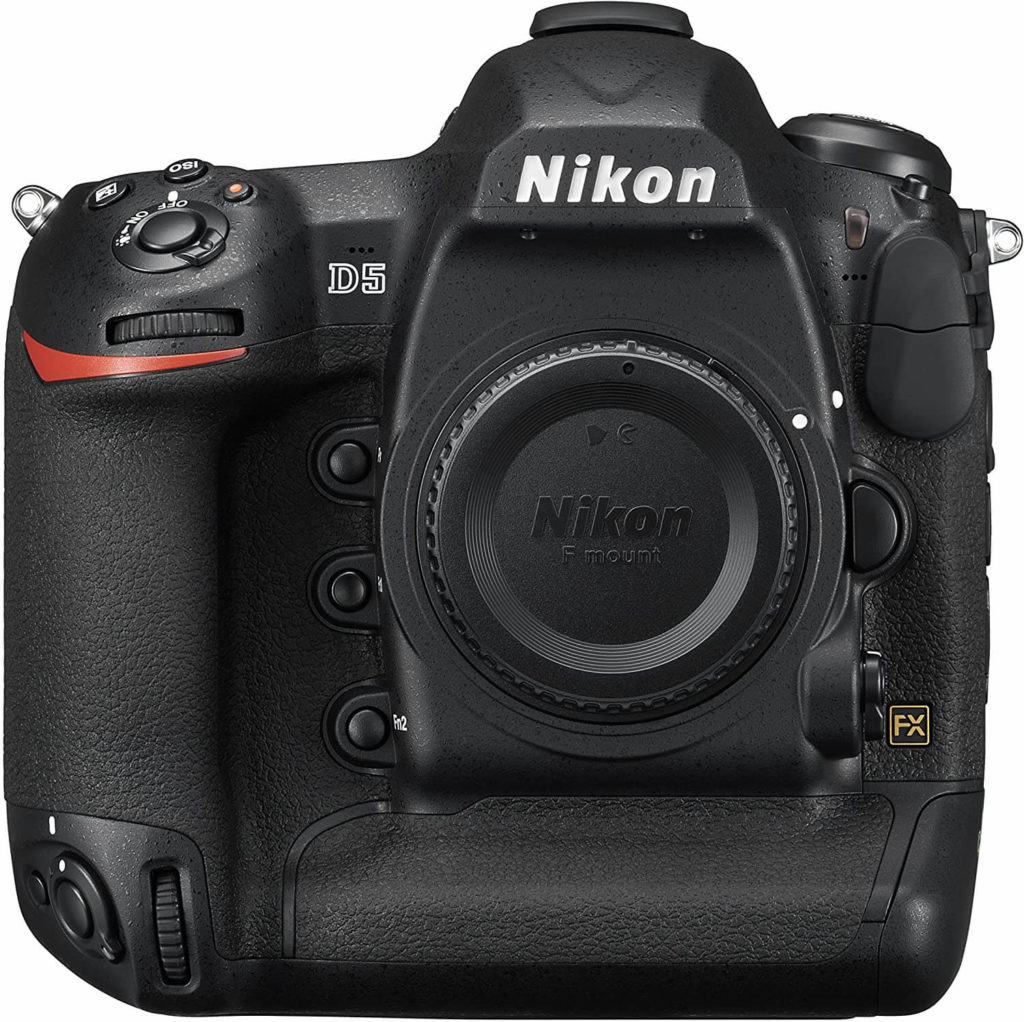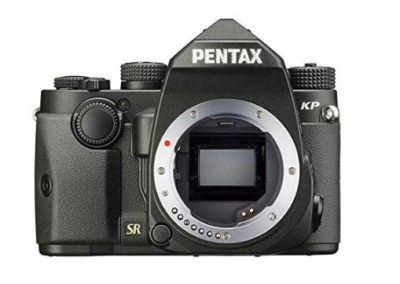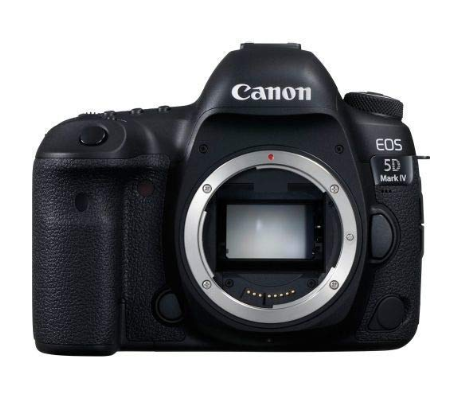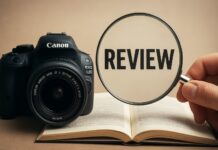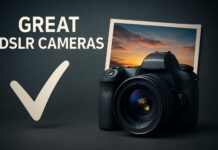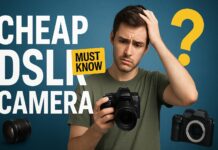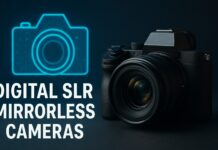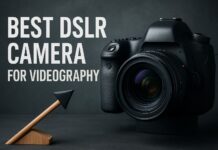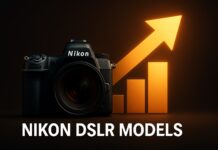If you’re looking to buy a DSLR in 2025, you’re making a smart choice. While the industry pushes mirrorless, DSLRs offer unmatched reliability, proven technology, and extensive lens ecosystems – often at better value. After decades of photographing everything from wildlife to weddings, I can tell you that DSLRs remain exceptional tools for serious photography.
This comprehensive guide reviews the best DSLR cameras still worth buying in 2025, from professional workhorses to smart entry-level choices. I’ve tested most of these personally and know their real-world strengths and limitations.
Contents
- Best DSLR Cameras in 2025
- 1. Nikon D3500 with Accessories
- 2. Nikon D850
- 3. Canon EOS Rebel T7i
- 4. Canon EOS 6D Mark II
- 5. Canon EOS 90D
- 6. Canon Rebel T7
- 7. Nikon D7500
- 8. Nikon D5600
- 9. Canon EOS Rebel SL2
- 10. Canon EOS 4000D / Rebel T100
- 11. Nikon D5
- 12. Nikon D500
- 13. Pentax KP
- 14. Canon EOS 5D Mark IV
- 15. Canon EOS Rebel SL3
- 16. Nikon D780
- 17. Canon EOS 250D
- 18. Nikon D750
- Our Top Overall Pick: Nikon D850
- Best Value DSLR
Considerations When Choosing a DSLR Camera
There are significant differences between DSLR models, so carefully consider these factors to find the perfect camera. This is your essential DSLR buying guide for 2025.
Budget
DSLRs span a wide price range. You can find excellent entry-level models under $500, or invest several thousand in professional flagships. The good news? Many professional-grade DSLRs from 2-3 years ago are now available at substantial discounts as manufacturers pivot to mirrorless.
Purpose
Are you a beginner learning photography fundamentals, or a professional needing bulletproof reliability for paid work? Your needs determine whether you should invest in entry-level, enthusiast, or pro-grade equipment. The best professional DSLR cameras offer weather sealing, dual card slots, and build quality that can withstand years of heavy use.
Brand
Canon and Nikon dominate the DSLR market with the most extensive lens selections and accessories. However, don’t overlook Pentax – they still manufacture new DSLRs in 2025 and offer unique features like in-body stabilization and weather sealing at competitive prices.
Sensor Size
Full-frame sensors (35mm) provide superior low-light performance, shallower depth of field, and wider dynamic range. APS-C (crop sensor) cameras are smaller, lighter, and more affordable, with no practical disadvantage for most photography. I’ve shot magazine covers with both – sensor size matters less than skill and lighting.
Lenses & Accessories
This is where DSLRs shine. Decades of lens production mean you can find excellent used glass at bargain prices. Check compatibility with your chosen system and budget for at least one quality prime lens – you’ll get sharper images than any kit zoom.
Weight & Size
DSLRs are heavier than mirrorless cameras, but the weight provides stability for telephoto work. If you’re hiking or traveling light, consider an APS-C model. For studio or event work, the heft of a full-frame DSLR feels reassuring.
Video Capability
Most current DSLRs offer 4K video, though mirrorless cameras typically have better video autofocus. If video is your primary focus, you might want a mirrorless camera instead. For hybrid photo/video work, the Canon EOS 90D and Nikon D780 excel.
Best DSLR Cameras in 2025
Here are the best DSLRs still worth buying in 2025. These are real DSLRs with optical viewfinders and mirror mechanisms – no mirrorless or bridge cameras included.
1. Nikon D3500 with Accessories
The entry-level D3500 remains one of the best cheap DSLR cameras when you consider the complete accessory bundle. You get a flash, 64GB SD card, strap, lens filters, battery charger, storage bag, tripod, and lens converters offering telephoto, wide-angle, and macro effects.
The 24.2MP APS-C sensor delivers excellent image quality with an ISO range up to 25600 for low-light shooting. It shoots 1080p video at 60 fps and continuous stills at 5 fps. Battery life is exceptional – I’ve shot 1,400+ images on a single charge during wedding coverage.
The D3500 has no touchscreen and limited wireless connectivity (SnapBridge can be temperamental), but the image quality punches well above its weight class. This is the camera I recommend to students learning manual exposure.
Pros
- Exceptional value with comprehensive accessory kit
- Outstanding battery life (1,550 shots per charge)
- Excellent image quality for the price
- Lightweight and easy to handle
Cons
- No touchscreen interface
- SnapBridge wireless connectivity can be unreliable
- Basic accessory quality
- No 4K video
2. Nikon D850
The D850 is legendary – and for good reason. This 45.7MP full-frame powerhouse remains one of the best DSLRs ever made, even years after release. I’ve used mine for landscape work where I’ve printed images 40×60 inches with stunning detail.
The D850 shoots up to 9 fps (with battery grip), records uncropped 4K video at 30fps, and offers 1080p slow-motion at 120fps. The 153-point autofocus system is extraordinarily accurate, and the camera excels in low light. The tilting touchscreen is useful for low-angle work, and battery life is phenomenal – easily 1,800+ shots per charge.
Build quality is tank-like with complete weather sealing. This camera will outlast most mirrorless models. If you’re serious about image quality and don’t need cutting-edge autofocus for fast action, the D850 delivers professional results for years to come.
Pros
- Exceptional 45.7MP resolution with stunning detail
- Superb dynamic range and low-light performance
- Excellent build quality and weather sealing
- Outstanding battery life
- 4K video with full sensor readout
Cons
- High price point (around $3,000 body only)
- Heavy at 2.2 lbs (915g)
- Large file sizes require substantial storage
3. Canon EOS Rebel T7i
The T7i (also called 800D internationally) hits a sweet spot for enthusiasts moving beyond absolute beginner gear. The 24.2MP APS-C sensor produces excellent images with a wide ISO range up to 25600 for low-light versatility.
What sets the T7i apart is its Dual Pixel autofocus – tap anywhere on the 3-inch touchscreen to focus instantly, even during video recording. Continuous shooting reaches 6 fps (Canon’s website shows 6, not 60 fps as some sources claim). The articulating touchscreen makes overhead and low-angle shooting comfortable.
Connectivity includes WiFi, Bluetooth, and NFC for easy smartphone pairing. The T7i lacks 4K video, which is its main limitation in 2025. For stills photography with excellent ergonomics and intuitive controls, it’s a solid mid-range choice.
Pros
- Excellent Dual Pixel autofocus system
- Intuitive touchscreen interface
- Good image quality with wide ISO range
- Articulating screen for flexible shooting
Cons
- No 4K video recording
- WiFi transfer can be slow
- Entry-level build quality
4. Canon EOS 6D Mark II
The 6D Mark II is Canon’s entry-level full-frame DSLR, featuring a 26.2MP sensor with Dual Pixel autofocus. The 45-point AF system works across a wide area of the frame when using Canon EF lenses. The vari-angle 3-inch touchscreen is excellent for creative angles.
The maximum ISO of 40,000 (expandable to 102,400) provides strong low-light capability, though dynamic range trails competitors like the D850. It shoots 6.5 fps continuous and records 4K video, though with a significant crop factor.
GPS, WiFi, NFC, and Bluetooth are all built-in for comprehensive connectivity. The 6D Mark II is weather-sealed and comfortable for all-day shooting. It’s a capable wedding and portrait camera, though landscape photographers may prefer the D850’s superior dynamic range.
Pros
- Full-frame sensor at reasonable price
- High ISO performance for low light
- Comprehensive connectivity options
- Vari-angle touchscreen
- 4K video capability
Cons
- Moderate dynamic range for landscape work
- 4K video has significant crop factor
- Higher price than APS-C alternatives
5. Canon EOS 90D
The 90D is Canon’s top-tier APS-C DSLR and an absolute workhorse. The 32.5MP sensor provides incredible resolution – more than enough for large prints or aggressive cropping. I’ve used this for wildlife photography where the 1.6x crop factor effectively extends lens reach.
Continuous shooting hits 10 fps with reliable tracking autofocus. The 90D records uncropped 4K video at 30fps and 1080p at 120fps for slow motion. Dual Pixel autofocus works beautifully for both stills and video. Face and eye detection keeps portraits sharp.
The 90D has weather sealing and solid build quality. Battery life is excellent. My only complaints are the single SD card slot (backup security would be welcome at this level) and the 30-minute video recording limit.
Pros
- High 32.5MP resolution for detailed images
- Fast 10 fps burst shooting
- Excellent 4K video without crop
- Reliable Dual Pixel autofocus
- Weather-sealed body
Cons
- Single card slot (no backup)
- 30-minute video recording limit
- No in-body image stabilization
6. Canon Rebel T7
Invalid table id.The Rebel T7 (2000D internationally) is Canon’s most affordable DSLR, often bundled with multiple lenses and accessories. The kit typically includes an 18-55mm standard zoom, 75-300mm telephoto, and sometimes a 500mm preset telephoto, plus filters, SD card, tripod, and bag.
The 24.1MP APS-C sensor produces solid images with built-in WiFi for smartphone sharing. ISO range is 100-6400 (expandable to 12,800). Continuous shooting reaches 3 fps – adequate for casual use but limiting for action photography. Video tops out at 1080p 30fps.
The T7 is deliberately basic to hit an aggressive price point. There’s no touchscreen, and autofocus has just 9 points (adequate for static subjects, challenging for moving ones). Build quality feels plasticky. However, for absolute beginners wanting Canon’s lens ecosystem, this gets you started.
Pros
- Comprehensive lens and accessory bundle
- Affordable entry into Canon system
- Easy to use in auto modes
- WiFi connectivity
Cons
- Limited 9-point autofocus
- No touchscreen
- Basic build quality
- Slow 3 fps burst rate
- Included telephoto lenses are low quality
7. Nikon D7500
Table could not be displayed.The D7500 is Nikon’s enthusiast APS-C DSLR and possibly the best all-around DSLR under $1,500. The 20.9MP sensor (borrowed from the flagship D500) delivers outstanding image quality with excellent high-ISO performance up to 51,200 (expandable to 1,640,000).
The 51-point autofocus system with 3D tracking is exceptionally capable for action photography. I’ve shot motorsports with this camera and consistently achieved sharp focus on fast-moving subjects. Continuous shooting reaches 8 fps for up to 100 JPEGs or 50 RAW files.
4K video recording is uncropped with stereo audio input. The tilting touchscreen is responsive. WiFi and Bluetooth via SnapBridge make wireless transfer possible (when the app cooperates). Weather sealing and solid build quality inspire confidence in challenging conditions.
Pros
- Outstanding image quality with excellent low-light performance
- Professional-grade 51-point AF system
- Fast 8 fps burst shooting
- Uncropped 4K video
- Weather-sealed construction
Cons
- SnapBridge app can be frustrating
- Single SD card slot
- Menu system has learning curve
8. Nikon D5600
The D5600 is Nikon’s mid-range APS-C DSLR featuring a 24.2MP sensor and a fully articulating 3.2-inch touchscreen. The touchscreen interface is intuitive – tap to focus and shoot, swipe to review images.
Battery life is exceptional at roughly 970 shots per charge, one of the D5600’s standout features. It records 1080p video at 60fps with continuous autofocus. The camera has built-in WiFi and Bluetooth via SnapBridge for wireless image transfer.
The D5600 offers 39-point autofocus (adequate for general use, though not as sophisticated as the D7500’s system). ISO range extends from 100-25,600. The fully articulating screen makes vlogging and creative angles easy. This is an excellent step-up camera for enthusiasts wanting more capability than entry-level models.
Pros
- High-resolution 24.2MP sensor
- Excellent battery life (970 shots)
- Fully articulating touchscreen
- Good high-ISO performance
- Lightweight and portable
Cons
- SnapBridge wireless can be unreliable
- Video autofocus is slow
- No 4K video
- Plastic build feels less robust
9. Canon EOS Rebel SL2
The SL2 (200D internationally) holds the distinction of being one of the smallest and lightest DSLRs ever made – perfect for travel photography where weight matters. Despite its compact size, it features a 24.2MP APS-C sensor producing excellent images.
The 3-inch fully articulating touchscreen flips completely forward for vlogging or selfies. Dual Pixel autofocus provides smooth focus tracking during video recording. WiFi and NFC enable wireless connectivity to smartphones. An external microphone input improves audio quality for video work.
The SL2 has 9 autofocus points (basic compared to more expensive models) and shoots 5 fps continuous. It records 1080p 60fps video but lacks 4K. Build quality is plasticky to achieve the small size and light weight. This camera suits travelers and casual photographers prioritizing portability.
Pros
- Extremely compact and lightweight for a DSLR
- Fully articulating screen (ideal for vlogging)
- Good image quality from 24.2MP sensor
- Dual Pixel autofocus for video
Cons
- Only 9 autofocus points
- No 4K video
- Plastic build feels less durable
- Kit lens quality is mediocre
10. Canon EOS 4000D / Rebel T100
The 4000D is Canon’s absolute entry-level DSLR, designed to be as affordable as possible. The 18MP APS-C sensor produces acceptable images in good light. It typically comes bundled with an 18-55mm kit lens plus accessories like SD card, neck strap, bag, tripod, and lens accessories.
The camera shoots 3 fps continuous and records 1080p 30fps video. The 2.7-inch LCD screen is fixed (no articulation) and lacks touch functionality. There are 9 autofocus points and WiFi connectivity. ISO range is 100-6400 (expandable to 12,800).
The 4000D saves images only as JPEG (no RAW), significantly limiting post-processing flexibility – a serious drawback for anyone wanting to learn photography seriously. Build quality is basic plastic. This camera is adequate for absolute beginners on tight budgets but will be quickly outgrown by enthusiasts.
Pros
- Very affordable entry point
- Accessory bundle adds value
- Simple controls for beginners
- WiFi connectivity
Cons
- JPEG-only (no RAW format)
- Very basic feature set
- Low 3 fps burst rate
- Plasticky build quality
- Quickly outgrown by progressing photographers
11. Nikon D5
The D5 is Nikon’s professional flagship DSLR – built for photojournalists, sports photographers, and wildlife shooters who demand absolute reliability in extreme conditions. The 20.8MP full-frame sensor may seem modest in resolution, but it prioritizes speed, low-light performance, and file size over megapixel count.
The D5 shoots an incredible 12 fps (14 fps in mirror-up mode) for up to 200 RAW images in a single burst. The 153-point autofocus system with 3D tracking is phenomenal – I’ve shot NFL games with this camera and it keeps razor-sharp focus on athletes moving unpredictably.
ISO range extends from 100-102,400 natively, expandable to an astounding ISO 3,280,000. This camera sees in the dark. 4K video records at 30fps. Dual card slots (XQD or CF depending on version) provide redundancy for critical work. Battery life exceeds 3,700 shots per charge.
Build quality is absolutely bulletproof with complete weather sealing. The D5 is heavy at 3.2 lbs, but the weight inspires confidence. This is overkill for hobbyists but essential for professionals who can’t afford equipment failure.
Pros
- Exceptional 12-14 fps burst shooting
- Phenomenal autofocus system (153 points)
- Unmatched ISO performance (up to 3,280,000 expanded)
- Dual card slots for backup
- Bulletproof build and reliability
- Outstanding battery life (3,700+ shots)
Cons
- Very expensive ($6,500+ body only)
- Heavy at 3.2 lbs (1,415g)
- Lower resolution than D850
- Overkill for casual photography
12. Nikon D500
The D500 is essentially a smaller, APS-C version of the flagship D5, sharing much of its professional DNA. The 20.9MP DX-format sensor prioritizes speed and performance over resolution. The tilting 3.2-inch touchscreen is useful for low-angle wildlife work.
The D500 features the same professional 153-point autofocus system as the D5 – extraordinary capability for an APS-C camera. It shoots 10 fps for up to 200 RAW frames continuously. ISO extends from 100-51,200 (expandable to 1,640,000). The camera records 4K video at 30fps and 1080p at 60fps.
WiFi, Bluetooth, and NFC are built-in for wireless connectivity. The D500 has dual card slots (XQD + SD) for backup security. Build quality matches professional standards with complete weather sealing. This camera excels for wildlife, sports, and action photography where the APS-C crop factor provides extra reach.
Pros
- Professional-grade 153-point AF system
- Fast 10 fps continuous shooting
- Excellent high-ISO performance
- Dual card slots (XQD + SD)
- Robust weather-sealed build
- APS-C crop factor extends telephoto reach
Cons
- Battery life is moderate compared to other Nikons
- WiFi usage drains battery quickly
- High price for APS-C sensor
13. Pentax KP
The Pentax KP deserves consideration if you’re willing to explore beyond Canon and Nikon. Pentax still manufactures DSLRs in 2025 and offers features not found elsewhere. The 24.3MP APS-C sensor includes 5-axis in-body image stabilization – unusual for DSLRs – which works with any lens you attach.
The KP is fully weather-sealed and dustproof with impressive durability. ISO range extends from 100-819,200, providing strong low-light capability. The unique Pixel Shift Resolution mode captures four images simultaneously and combines them for exceptional detail and color accuracy – excellent for landscape and product photography on a tripod.
The tilting LCD screen adjusts vertically for high and low angles. The camera’s physical controls are extensive, though the control layout takes time to learn. Battery life is moderate – carry spares for long shooting days. Pentax’s lens selection is smaller than Canon/Nikon, but excellent used lenses are available affordably.
Pros
- In-body image stabilization (rare for DSLRs)
- Excellent weather sealing and build quality
- Unique Pixel Shift Resolution for ultimate detail
- Wide ISO range for low light
- Tilting screen for flexible shooting
Cons
- Moderate battery life
- Smaller lens selection than Canon/Nikon
- Learning curve for menu and controls
- Fewer third-party accessory options
14. Canon EOS 5D Mark IV
The 5D Mark IV is Canon’s workhorse full-frame DSLR for professional and advanced enthusiast photographers. The 30.4MP full-frame sensor balances resolution and performance beautifully. Dual Pixel autofocus provides exceptionally smooth focus transitions during video recording.
The 5D Mark IV shoots 7 fps continuous with reliable 61-point autofocus (41 cross-type points). It records 4K video at 30fps internally, or outputs 4K via HDMI for external recording. The camera can be used as a webcam via Canon’s EOS Utility software – useful for streaming or video calls.
WiFi, NFC, and GPS are built-in. The touchscreen interface is responsive for quick menu navigation and focus point selection. Build quality is professional-grade with complete weather sealing. Battery life averages 900 shots per charge. The fixed LCD screen (no articulation) is the main limitation compared to the 6D Mark II.
Pros
- Excellent 30.4MP full-frame sensor
- Smooth Dual Pixel autofocus for video
- 4K video recording capability
- EOS Utility webcam software support
- Professional build with weather sealing
- Responsive touchscreen interface
Cons
- Fixed LCD screen (no articulation)
- Moderate dynamic range compared to competitors
- Battery life averages 900 shots (good but not exceptional)
- High price point
15. Canon EOS Rebel SL3
The SL3 (250D internationally) is Canon’s smallest DSLR with 4K video, making it popular with vloggers and travel photographers. Despite its compact size, it packs a 24.1MP APS-C sensor with Dual Pixel autofocus producing quality images.
The fully articulating 3-inch touchscreen makes the SL3 excellent for selfie-style vlogging. The camera records 4K video at 24fps (with crop) or 1080p at 60fps. Dual Pixel autofocus tracks faces and eyes during video recording. WiFi and Bluetooth enable wireless smartphone connectivity.
The optical viewfinder uses a 9-point autofocus system – basic but functional for general photography. Continuous shooting reaches 5 fps. The SL3 is lightweight and comfortable for all-day carry. Build quality is plastic to minimize weight. This camera bridges the gap between entry-level and enthusiast models.
Pros
- 4K video recording capability
- Very compact and lightweight
- Fully articulating touchscreen (great for vlogging)
- Dual Pixel autofocus for video
- WiFi and Bluetooth connectivity
Cons
- Only 9 autofocus points
- 4K has significant crop factor
- Plastic body feels less premium
- Limited customization options
16. Nikon D780
Table could not be displayed.The D780 represents Nikon’s most advanced DSLR evolution, incorporating mirrorless technology into a traditional DSLR body. The 24.5MP full-frame sensor produces stunning images with wide dynamic range. What makes the D780 unique is its hybrid autofocus system – it uses traditional phase-detect AF in the viewfinder (51 points) and switches to 273-point on-sensor AF in live view mode.
This dual system gives the D780 mirrorless-like video autofocus performance while retaining the optical viewfinder benefits. It shoots 7 fps via viewfinder or 12 fps in live view (with AF locked). 4K video records at 60fps – the highest frame rate of any DSLR – with excellent quality.
Battery life is phenomenal at 2,260 shots per charge. The tilting touchscreen aids composition. Build quality is professional with complete weather sealing. The D780 is expensive but represents the pinnacle of DSLR design before Nikon’s full mirrorless commitment.
Pros
- Hybrid autofocus system (best of both worlds)
- 4K 60fps video (highest for DSLRs)
- Exceptional battery life (2,260 shots)
- Full-frame sensor with excellent dynamic range
- Professional build and weather sealing
- Fast 12 fps in live view mode
Cons
- No in-body image stabilization
- High price point
- Some lenses produce audible noise during video AF
17. Canon EOS 250D
The EOS 250D (Rebel SL3 in North America, already covered above) is Canon’s entry-level 4K DSLR designed for beginners and enthusiasts who want compact size without sacrificing modern features. The 24.1MP APS-C sensor with Dual Pixel autofocus delivers reliable image quality.
This camera shoots 5 fps continuous and records 4K video at 24fps or 1080p at 60fps. The DIGIC 8 processor provides good performance and efficient battery usage. The vari-angle touchscreen LCD makes creative shooting angles accessible. Creative Assist mode helps beginners achieve specific looks without understanding technical settings.
WiFi and Bluetooth connectivity make smartphone pairing straightforward. The 250D is light enough for all-day carry and intuitive enough for photography newcomers. It lacks weather sealing and has basic build quality, but at this price point, it’s a capable all-rounder.
Pros
- Perfect for beginners (easy to use)
- 4K video capability
- Affordable price point
- Wireless connectivity (WiFi + Bluetooth)
- Compact and lightweight
Cons
- Not full-frame
- 4K video has crop factor
- Basic plastic build quality
- Limited advanced controls
18. Nikon D750
Table could not be displayed.The D750 is Nikon’s original “affordable” full-frame DSLR, now available at excellent used prices as it’s been superseded by the D780. Don’t let its age fool you – the 24.3MP sensor still produces beautiful images with strong dynamic range.
The D750 shoots 6.5 fps continuous and records 1080p video (no 4K). The tilting LCD is useful for high and low angle work. The 51-point autofocus system is capable, though not as sophisticated as newer models. ISO range extends from 100-12,800 (expandable to 51,200).
Build quality is excellent with weather sealing, though less robust than the D850. The D750 weighs just 1.6 lbs, making it one of the lightest full-frame DSLRs. Battery life is strong at roughly 1,230 shots. Manual controls for ISO, aperture, and shutter speed are easily accessible.
The D750 is an excellent value buy in 2025 for photographers wanting full-frame quality without flagship prices. Used copies are plentiful and affordable.
Pros
- Excellent full-frame image quality
- Lightweight for full-frame (1.6 lbs)
- Tilting LCD screen
- Good battery life
- Available used at great prices
- Manual control accessibility
Cons
- No 4K video
- No built-in flash hot shoe cover or screen protector
- Older technology compared to D780
Our Top Overall Pick: Nikon D850
After reviewing the best DSLRs available in 2025, the Nikon D850 stands out as the overall champion. While expensive at around $3,000 for the body, it delivers flagship-level performance that will remain relevant for a decade or more.
The 45.7MP full-frame sensor produces files with breathtaking detail and dynamic range. Build quality is exceptional with complete weather sealing. Battery life is phenomenal. The D850 excels at landscapes, portraits, studio work, and even wildlife with the right lenses. It’s the last word in DSLR technology – a camera that does everything exceptionally well.
For professionals and serious enthusiasts, the D850 is an investment that pays dividends in image quality and reliability.
Best Value DSLR
For photographers on a budget who still want excellent features, the Canon EOS Rebel T7 offers outstanding value. At a very reasonable price, you get a 24.1MP sensor, WiFi connectivity, and often a comprehensive bundle including multiple lenses and accessories.
Invalid table id.While the T7 won’t win any performance awards, it provides a capable introduction to the Canon ecosystem with access to decades of affordable lenses. It’s perfect for beginners learning photography fundamentals without breaking the bank.
Which is the Best DSLR Camera for Beginners?
For first-time DSLR buyers, I recommend either the Nikon D3500 or Canon EOS Rebel T7, depending on your budget and brand preference. Both offer intuitive controls, excellent auto modes, and enough manual control to grow your skills.
The D3500 has superior battery life and slightly better image quality. The T7 often comes with more lenses and accessories in bundle deals. Both are light enough for comfortable all-day shooting and compatible with extensive lens systems.
If budget allows, the Canon EOS Rebel SL3/250D or Nikon D5600 add touchscreens and articulating LCDs that make learning more intuitive.
What is the Best DSLR Camera for the Money?
Value depends on your needs and budget level. Under $500, the Canon T7 bundles are hard to beat. In the $500-1,000 range, look at the Nikon D5600 or Canon T7i for a good balance of features and price.
For serious enthusiasts with $1,000-1,500 budgets, the Nikon D7500 offers professional-grade capabilities at an accessible price. It’s the sweet spot between entry-level and flagship models.
If you can invest $2,000-3,000, the Nikon D850 or Nikon D780 provide image quality and performance that rival any camera system at any price.
What is a DSLR Camera?
DSLR stands for Digital Single-Lens Reflex. Inside the camera, a mirror reflects light from the lens up through a pentaprism to the optical viewfinder. When you press the shutter button, the mirror flips up, allowing light to hit the sensor and capture the image.
This mirror mechanism gives DSLRs their characteristic “viewing experience” – you see the actual optical image through the lens, not an electronic representation. This provides zero lag, no battery drain for viewing, and works perfectly even in bright sunlight where electronic viewfinders can wash out.
DSLRs come at all price points and feature levels, suitable for beginners through full-time professionals. The technology is mature and reliable, with extensive lens ecosystems built over decades.
Which DSLR is Best for Me?
The best DSLR depends entirely on your photography goals, budget, and experience level. Entry-level models like the D3500 or T7 are ideal for beginners learning fundamentals. They’re affordable, forgiving, and have enough features to keep you engaged as you improve.
Enthusiasts who understand exposure and want faster autofocus, better build quality, and advanced features should look at the D7500, Canon 90D, or Nikon D500. These cameras handle demanding situations like sports, wildlife, and low light with confidence.
Professionals and serious amateurs needing full-frame image quality, exceptional build quality, and maximum performance should invest in the D850, D780, 5D Mark IV, or for specialized action work, the D5. These cameras are tools for creating income – their reliability and image quality justify premium prices.
Which Lenses Will I Need?
Most DSLRs are sold either body-only or with an 18-55mm kit lens (for APS-C) or 24-70mm (for full-frame). Kit lenses are optically adequate for learning but rarely inspire creative breakthroughs.
I recommend every photographer invest in at least one prime lens – lenses with fixed focal lengths that don’t zoom. Prime lenses are sharper, faster (wider apertures), and force you to think compositionally by moving your feet. For Canon APS-C, get a 50mm f/1.8 ($125). For Nikon, get the 35mm f/1.8G DX ($200) or 50mm f/1.8G ($215).
Beyond your first prime, lens choice depends on your subjects:
- Portraits: 85mm f/1.8 or 50mm f/1.4
- Landscapes: 10-24mm wide-angle zoom
- Wildlife/Sports: 70-300mm or 100-400mm telephoto
- Macro: 60mm or 105mm macro lens
- General use: 24-70mm f/2.8 or 24-105mm f/4
Don’t overlook used lenses – DSLR glass holds value well, and you can find professional lenses at 40-60% off retail. Canon EF and Nikon F-mount lenses have been produced for decades, so selection is enormous.
DSLR vs Mirrorless: Which Should You Choose?
This is the question every camera buyer faces in 2025. The camera industry has largely moved to mirrorless, but DSLRs remain compelling for several reasons:
Choose a DSLR if you:
- Prefer optical viewfinders with zero lag
- Want exceptional battery life (1,000+ shots per charge)
- Value mature, reliable technology
- Want access to decades of affordable used lenses
- Prioritize rugged build quality and weather sealing
- Prefer larger, more substantial camera bodies
Choose mirrorless if you:
- Want the latest autofocus technology (especially eye-tracking)
- Prioritize compact size and light weight
- Shoot lots of video with autofocus
- Want in-body image stabilization
- Value silent electronic shutters
- Want advanced features and more settings/scene modes
The truth? Both systems produce excellent images. I’ve shot professionally with DSLRs for 15 years and mirrorless for 5 years. Image quality differences are negligible – lighting, composition, and photographer skill matter far more than the camera type.
DSLRs offer better value in 2025 because prices have dropped as manufacturers push mirrorless. You can get flagship DSLR performance for 40-50% less than equivalent mirrorless bodies. The used market is flooded with excellent DSLRs from photographers upgrading to mirrorless.
If you’re buying your first serious camera, a DSLR gets you professional-level tools at enthusiast prices. Use the money you save to invest in quality lenses and education – that’s where image quality actually improves.
The Future of DSLRs
Let’s be honest: DSLR development has essentially stopped. Canon and Nikon have ceased developing new DSLR models, focusing entirely on mirrorless systems. Pentax remains the only manufacturer still producing new DSLRs in 2025.
However, this doesn’t mean DSLRs are obsolete. The technology is mature and completely reliable. My Nikon D850 will produce professional-quality images for another 15 years. Film cameras from the 1970s still work beautifully – mature technology lasts.
Think of current DSLRs as the final, most refined versions of proven technology. They’re not cutting-edge, but they’re perfected. No bugs, no firmware issues, no experimental features. Just reliable tools that capture light and make images.
The used market will provide abundant DSLR bodies and lenses at declining prices for years to come. For photographers focused on image creation rather than gear acquisition, this is a golden age for affordable, professional-quality equipment.
Last update on 2026-02-04 / Affiliate links / Images from Amazon Product Advertising API

